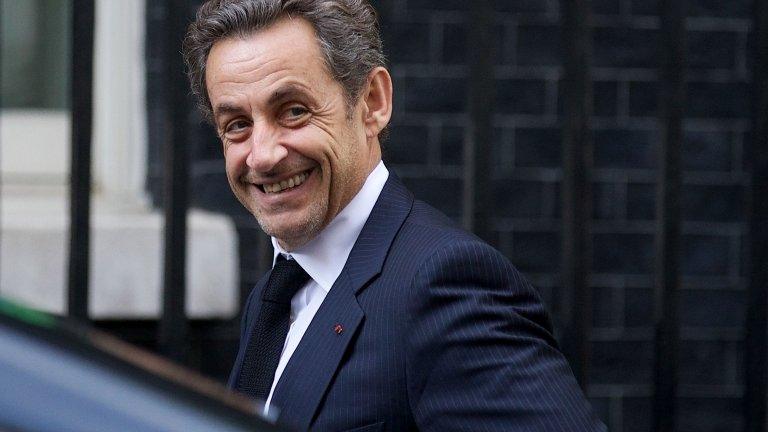France's ex-President Sarkozy put under investigation
- Published
Former French President Sarkozy placed under investigation
Ex-French President Nicolas Sarkozy has been placed under formal investigation over alleged influence peddling.
He appeared before a judge in Paris late on Tuesday after 15 hours of questioning by anti-corruption police.
This is thought to be the first time a former French head of state has been held in police custody.
Mr Sarkozy's lawyer, Thierry Herzog, and senior prosecutor Gilbert Azibert were also placed under formal investigation over the allegations.
There was no word on the questioning of a second prosecutor, Patrick Sassoust, who had also been in custody.
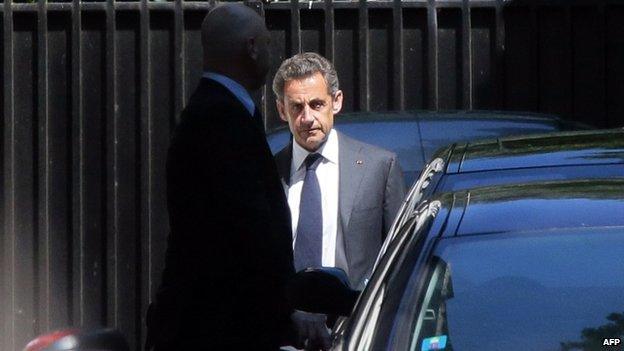
The former president is expected to be interviewed about the case on French radio and TV
The allegation against Mr Sarkozy is that he sought insider information from a judge regarding an investigation into illegal campaign financing.
Mr Sarkozy denies any wrongdoing and is due to be interviewed live on French TV on Wednesday evening.
He has received support from several high-ranking party colleagues. Former PM Alain Juppe wrote on his Twitter feed, external: "I'm thinking in friendship of Nicolas Sarkozy: he is of course presumed innocent."
President Francois Hollande also stressed the presumption of innocence, his spokesman said.

French press review
Taking in the "shock wave", Le Figaro, the newspaper of choice for many French conservatives, asks if Nicolas Sarkozy is not being singled out for political reasons. Yves Threard suggests that French judges are seeking revenge for criticisms he made of the justice system while in office, when he famously described magistrates as indistinguishable "little peas".
Writing in the centre-left daily Liberation, Eric Decouty, external argues that Mr Sarkozy must take responsibility for his actions if he wishes to return to politics. "Even if the former head of state has never made morality his chief virtue, he cannot scorn certain values essential to our democracy," he says.
The French justice system may now be doing the "dirty work" of Mr Sarkozy's own party, Patrice Chabanet suggests in an editorial for regional daily Le Journal de la Haute-Marne, external. Other figures in the party like former prime ministers Francois Fillon and Alain Juppe "want to turn the page of Sarkozyism", he argues. Even if Mr Sarkozy emerges from his legal troubles exonerated of blame, the cost to his political career may be too great, he suggests.

When a suspect is placed under formal investigation, he or she is then examined by a judge, who determines whether there is sufficient evidence for the suspect to be charged.
The step often, but not always, leads to trial. Influence-peddling can be punished by up to 10 years in prison and a fine of 150,000 euros (£120,000; $205,000).
'Not a lot'
Mr Sarkozy was released from custody around midnight (22:00 GMT) after appearing in court in Paris.
He had been brought to the court from the judicial police office in Nanterre, west of the French capital, where he had been interrogated.
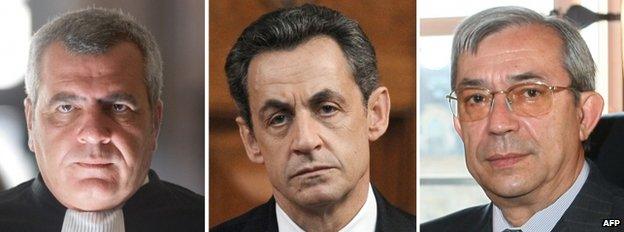
Lawyer Thierry Herzog (l) and magistrate Gilbert Azibert (r) are being investigated along with Mr Sarkozy (c)
Paul-Albert Iweins, the lawyer representing Mr Herzog, said the case rested only on "phone taps... whose legal basis will be strongly contested".
"There's not a lot in this dossier, since none of the material elements of what I've seen, and what we could contest, support the accusations," he added.
Investigators are trying to find out whether Mr Sarkozy, 59, who was president from 2007 to 2012, had promised a prestigious role in Monaco to Mr Azibert, in exchange for information about an investigation into illegal campaign funding. He was never given the job.

Investigations into Sarkozy
July 2014: Placed under formal investigation on suspicion of peddling influence to obtain details from a magistrate about legal proceedings against him in 2013
October 2013: A criminal investigation into allegations he solicited secret campaign financing in 2007 from France's richest woman, Liliane Bettencourt, is dropped
April 2013: Judges open an inquiry into allegations that the Gaddafi regime helped finance his 2007 election campaign
February 2014: Named as a witness in investigation into funding for Edouard Balladur's unsuccessful presidential bid in 1995
A number of other inquiries are under way into wrongdoing by senior officials during his presidency, in which he has not figured directly

The inquiry into funding is looking into whether Mr Sarkozy received illegal donations for the 2007 election campaign from late Libyan leader, Muammar Gaddafi.
Mr Sarkozy is hoping to challenge again for the presidency in 2017 and the allegations are seen as a blow to his hopes of returning to office.
His predecessor, Jacques Chirac, was given a suspended prison sentence in 2011 for embezzlement and breach of trust while he was mayor of Paris but he was never questioned in custody.

Analysis: The BBC's Hugh Schofield in Paris
Mr Sarkozy is a step closer to coming to trial. The judges investigating this have decided that there is a case to answer although a trial is not inevitable. It does mean that there is a much bigger, darker cloud of suspicion hanging over him.
Worried by the prying of investigators into claims of illegal party fund-raising, it is alleged that Mr Sarkozy used a judge as point-man in the High Court of Appeal to tell him how proceedings against him were progressing. More serious is whether this judge tried to influence decisions in Mr Sarkozy's favour.
The former president was expected to announce his political comeback later this year, and his supporters are extremely suspicious about the timing of this latest development. It will be much harder now to launch a bid for leadership of the centre-right opposition with the prospect of criminal proceedings hanging over him.

- Published1 July 2014
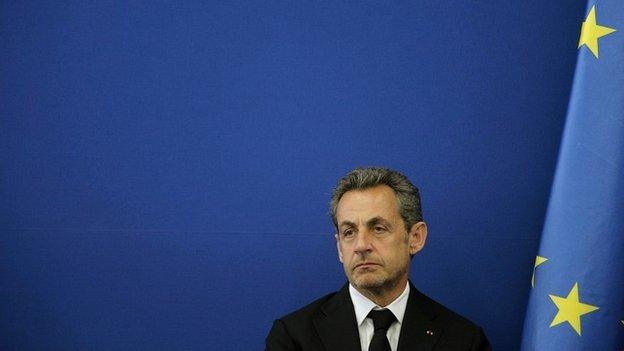
- Published29 March 2018
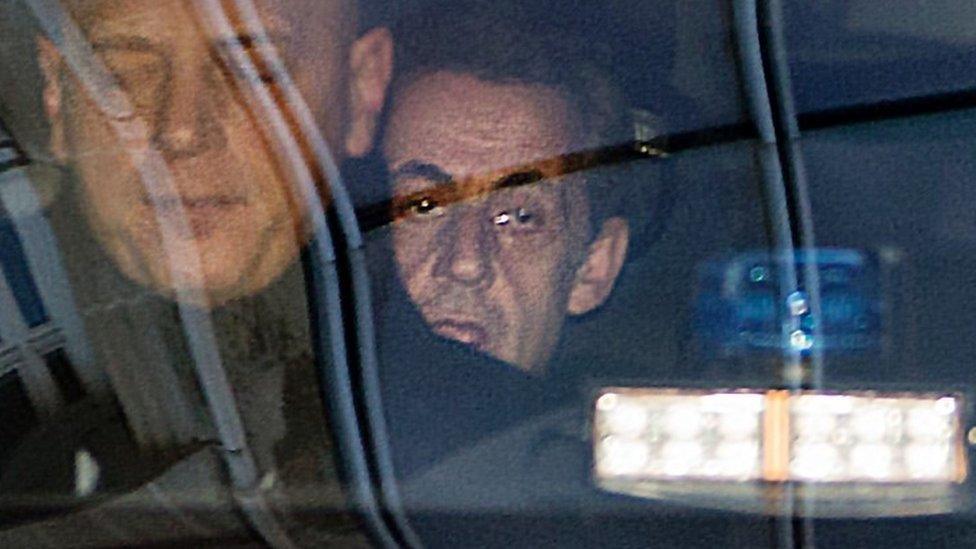
- Published8 January
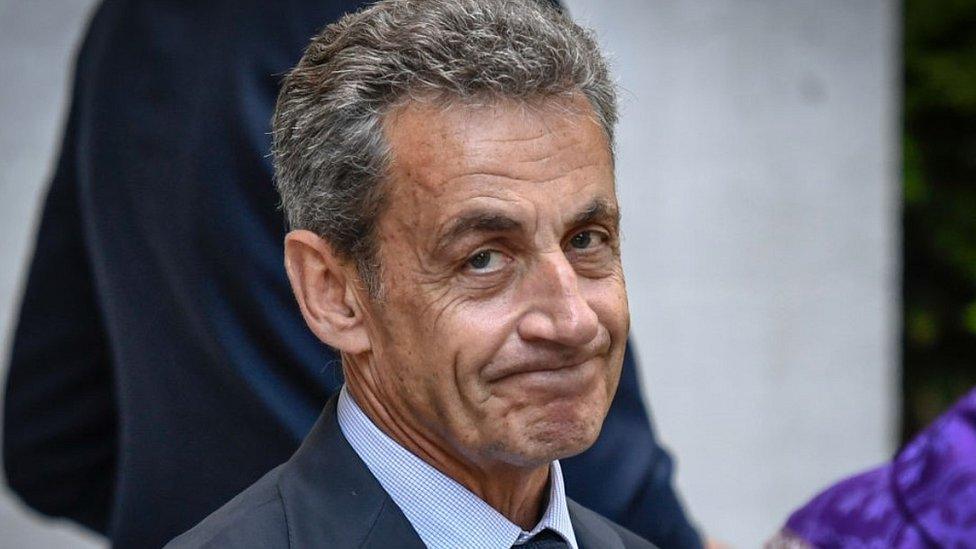
- Published7 March 2014
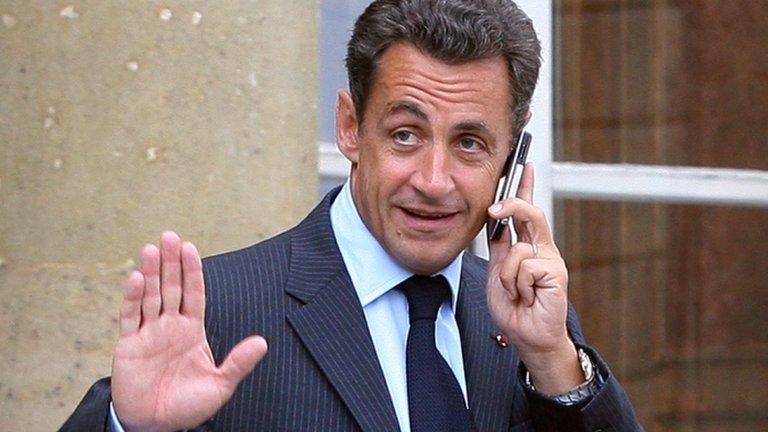
- Published20 June 2013
